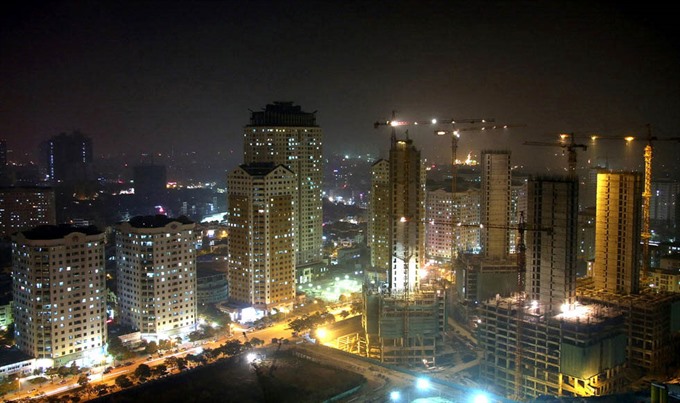 Society
Society

The capital city of Hà Nội is focused on building its e-government and smart city system.
 |
| Residential area of Trung Hòa-Nhân Chính in Thanh Xuân District. - VNA/VNS Photo Tuấn Anh |
HÀ NỘI – The capital city of Hà Nội is focused on building its e-government and smart city system.
The statement was made by the municipal People’s Committee Chairman Nguyễn Đức Chung during a recent working session in Hà Nội with over 100 overseas Vietnamese science and technology experts who attended an innovative network connection programme.
The chairman noted that Hà Nội was among the 17 largest capital cities in the world, with a population of about 10 million. Over 10 years of administrative boundary expansion, the city enjoys an average annual growth rate of 7.41 per cent.
“To date, the city has established a wide area network (WAN) in all 584 localities of 30 districts,” he said
“However, the city faces major challenges in terms of urban development, namely rapid population growth and environmental issues, as 97 per cent of waste is dumped in landfill sites.”
“Additionally, the rate of labourers without training remains high, especially in management and information technology,” he added.
The official voiced his hope that participants would connect domestic and foreign experts and scientists to seek solutions for these challenges, contributing to the development of Hà Nội and the nation.
At the session, participants discussed ideas to address various issues related to urban areas and socio-economic development in Hà Nội.
They shared their experiences in building smart cities, as well as advanced technologies in transport, healthcare, education, and environmental protection, among others.
They also showed willingness to co-operate with the city in attracting high quality human resources and applying modern technology.
The members of the innovative network were especially interested in the city’s healthcare sector.
Overloading at hospitals was a pressing concern for the city.
According to experts, one reasons for the overloading was that most people visited doctors when their illnesses had become serious, requiring long-term treatment.
To combat the problem, the city should standardize the healthcare process.
Associated Prof. Dr. Trần Đăng Xuân from Japan’s Hiroshima University, an expert on bio-technology, said the environment in Hà Nội was severely polluted causing harm to people’s health.
At present, the rate of people with cancer in Việt Nam in general, and in Hà Nội in particular, was alarming, said the expert.
His study group had developed a method of early cancer detection which was already being used in Hà Nội. But the fee for the service was too high (US$5,000 per session) for residents.
Xuân wanted support from the municipal authority to make the method more accessible.
Meanwhile, Cao Anh Tuấn, a postgraduate from San Francisco, said that the application of technology by foreign firms was making progress.
But many foreign technologies were not suitable for Vietnamese people and their specific ailments, Tuấn said.
So Vietnamese should co-operate with foreign experts to develop products that suit their needs, he said.
In terms of urban traffic development, Prof. Dr Vũ Lê Hải, an expert in smart traffic networks in Australia, said the city should focus on finding the fundamental cause of traffic congestion instead of concentrating on solutions as at present.
Urban planning must be carefully and properly drawn out, said the expert.
The experts expressed their willingness to support the city in luring high-qualified human resources to develop a smart city system.
Chairman Chung asked the experts and scientists to connect with local authorities via the startup portal startupcity.vn.
Sound collaboration between the city and the innovative network connection programme would create favourable conditions for them to contribute further to the nation, he said. – VNS




